Science, with practice
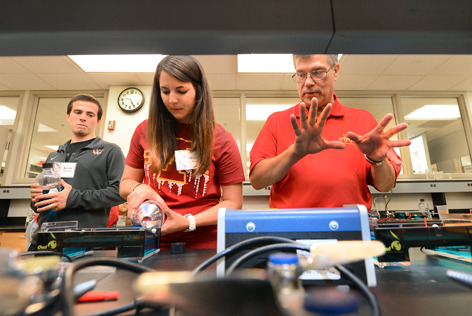
Fifteen middle and high school teachers from across Iowa are getting hands-on experience this week that will translate to their own classrooms. ISU's Office of Biotechnology is offering three June workshops that enhance STEM (science, technology, engineering, math) curriculums in schools and youth programs.
This week's focus is on biotechnology, with a CSI twist. Participants are learning lab activities such as DNA extraction, processing and analysis. Pictured is a "DNA fingerprinting" exercise, led by biotechnology outreach education coordinator Mike Zeller (right).
A bioethics workshop will be held next week and an advanced biotechnology course is scheduled the following week. Educators can earn professional development and graduate credits during the four-day workshops, and are eligible to receive free materials for their classrooms. Photo by Bob Elbert.
Regents issue phase 1 report in efficiency study
On Wednesday, the state Board of Regents shared a report (PDF) that summarizes phase 1 results and recommendations in a broad efficiency review of the three regent universities.
TIER forum
June 24 (9-11 a.m.)
Howe Hall auditorium
During the 10-week first phase of the TIER review, representatives of Deloitte Consulting visited each campus twice and conducted nearly 400 interview sessions in an effort to get to know the universities and collect ideas on reducing costs, increasing revenues and improving services.
Wednesday's four-page report summarizes those efforts and lists areas that will get special attention in the next phase. The consultants believe these areas present the greatest opportunities for efficiencies and cost savings. During Phase 2, which begins later this month, consultants will do detailed cost-benefit analyses to determine what efficiencies might be achieved in each area.
The broad areas of focus in phase 2 include:
- Sourcing and procurement, to analyze further improvement to purchasing practices
- Academic programs, to strengthen academic programs to achieve maximum competitiveness, to broaden non-traditional student access through distance education, and to better support institutional research practices and capabilities
- Information technology services, to examine ways to optimize how IT services are provided
- Facilities management, to explore ways to more effectively use university infrastructure and reduce utility consumption
- Finance, to determine ways to simplify the delivery of finance services
- Human resources, to optimize how HR services are provided
- Strategic space utilization, to improve building use rates
- Student services, to evaluate if a common application portal across the three universities would benefit students and the universities
The consultants noted that administrative functions will be the focus this summer, with a shift to the academic programs review once fall semester is underway and students and faculty are on campus. At its June 4 meeting, the regents approved a $1 million addendum to its $2.5 million contract with Deloitte to extend the service period into December for this purpose.
The university community can find out more and ask questions about the review at a campus forum on June 24 (9-11 a.m., Howe auditorium).
About the review
The expressed aim of the TIER (Transparent, Inclusive Efficiency Review) process, launched by the regents in late March, is to look at administrative and academic operations at the three state universities and find ways to maximize resources, improve efficiencies and contain costs.
Move-in begins at Elings, Sukup halls
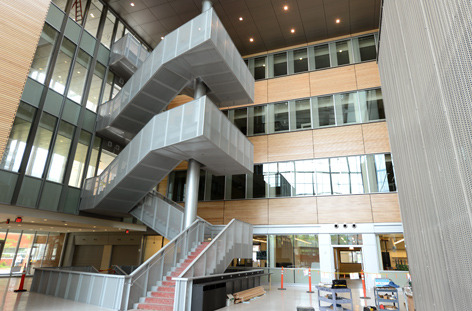
The three buildings share a four-story atrium: Elings Hall (left), Sukup Hall (center) and the Biorenewables Research Laboratory (right).
The first tenants occupied Elings Hall last week, one of two buildings that are the new home to the agricultural and biosystems engineering department. Its partner, Sukup Hall, contains research and teaching labs of all sizes. The two wings complete the biorenewables complex, phase 1 of which (Biorenewables Research Laboratory) opened in spring 2010. ABE faculty, staff and graduate students are relocating this summer from Davidson Hall (completed in 1922), Industrial Ed II (1926) and the National Swine Research/Information Center. Most of the moving should be complete by July 1, and the department will welcome students there when fall semester begins in August. Photos by Bob Elbert.
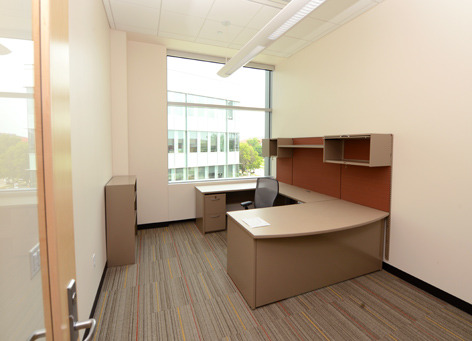
Move-in is pending for the occupant of this Elings Hall faculty office.
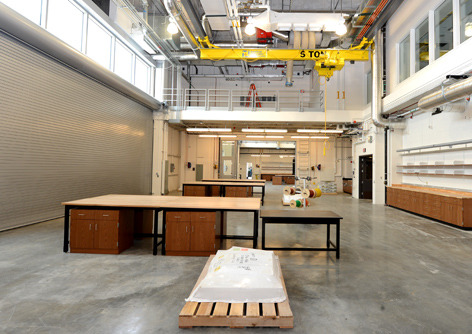
This Sukup Hall machine bay/teaching lab is equipped with a five-ton crane.
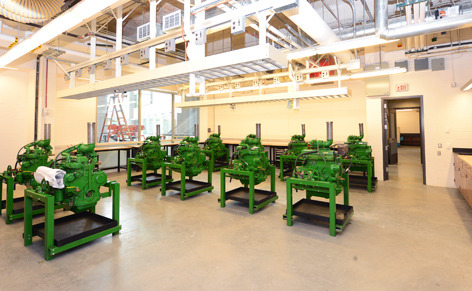
The tractor engine lab in Sukup Hall.
Summer visitors to campus
While Iowa State student numbers drop noticeably in the summer, our campus visitors data spikes. Here's a quick rundown of some of the larger groups heading our way -- and when.
| Group | Date | Participants | Staying on campus |
| Iowa Funeral Directors Association convention | May 12-15 | 400 | no |
| Alumni Days | May 15-16 | 275, senior alumni | no |
| Special Olympics Iowa Summer Games | May 22-24 | 2,700, all ages | yes |
| Odyssey of the Mind World Finals | May 28-31 | 8,000, youth elementary-college plus 7,000 family members | yes |
| Orientation: Fall 2014 | June 2-July 3 | 5,500+ freshman and transfer students | yes |
| Future Problem Solving Program International Conference | June 12-15 | 2,500, youth grades 4-12 | yes |
| USA Track & Field Iowa Association Junior Olympic Championships | June 21-22 | 1,000 | no |
| Iowa Reading Association Conference | June 24-25 | 850 IRA members | no |
| Iowa 4-H Youth Conference | June 24-26 | 1,000, high school | yes |
| National Junior Disability Championships | July 5-12 | 200-250, ages 7-22, physical disabilities | no |
| BravO National Dance & Talent Competition | July 7-13 | 1,000, all ages | no |
| Iowa Summer Games | July 11-13, July 17-20 (main weekend), July 25-27 | 14,000 over 3 weekends, all ages, youth and adults | yes |
| Farm Progress Show | Aug. 26-28 | no |
If you have a large group (100+) coming to campus this summer, send a note to inside@iastate.edu and we'll add it to the list.
